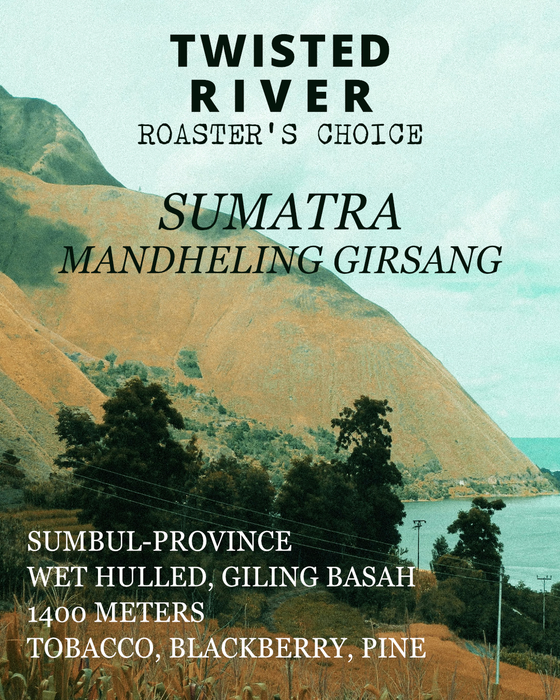
Last Month's Roaster's Choice (November)
November 2024
Sumatra Mandheling Girsang
Elevation: 1400 meters above sea leve
Grade: G1 TP (Grade 1, Triple Picked)
Region: Sumbul
Varietal: Arabica Gayo 1, Arabica Gayo 2
Process: Wet Hulled, Giling Basah
Tasting Notes: Tobacco, Blackberry, Dark Chocolate, Pine
Cup Score: 86
From the Sumbul region district of North Sumatran Regency of Dairi comes this delightful triple picked speciality coffee.
The Dairi Regency sits on the western border of the Lake Toba, the largest lake in Indonesia and the largest volcanic lake in the world. Lake Toba sits in the caldera of a supervolcanic eruption that occured ~70,000 years ago. Because of the volcanic ash, the soil in the surrounding areas is particularly loamy and filled with potassium and magnesium, leading to a unique and fertile terrior for growing coffee.
This coffee, like most Indonesian Coffees, goes through a "Wet Hull" process, known locally as "Giling Basah". Wet Hulling contributes to flavors like earth, tobacco, moss, spice, cedar. Indonesia has significantly more rain and humidity than other coffee growing regions of the world, so methods like natural processing (where the coffee cherries are left out in the sun for weeks at a time to dry) are impossible. Wet Hulling involves first removing the skins of the coffee cherries using a pulper, but leaving the fruit and mucilage attached. The fruit is fermented overnight, and then removed in the morning, leaving only a thin parchment around the bean that continues to slowly ferment.
From there, farmers will sell the beans to a collector or exporter, who is responsible for processing the coffees beans the rest of the way. The beans are air-dried further, but not all the way, with the thin parchment still surrounding the bean.
The beans are then put through what is called a "Wet Huller" which removes the thin parchment around the bean without damaging it. The beans at this point are still at their final moisture level for shipping, so they are air-dried until reaching this final moisture level. The beans dry quickly, but are exposed to ambient yeast and temperature fluctuations that give them their signature earthy notes.
